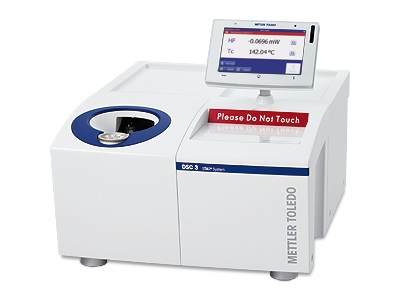Differential scanning calorimetry analysis provides insight into critical physical properties of materials by testing their response to heat. The heating of both a sample and reference material provides a validated relative temperature response and heat capacity. These furnace-based systems are perfect for studying unique phase-change properties, such as with liquid crystals, determining quantitative enthalpy of materials, or testing the elasticity of products exposed to extreme temperatures and/or pressures. Differential scanning calorimeters offer temperature ranges as low as -180C and as high as 2400C, with the highest available heating rate at 300 K/min for DSC analysis. The principle models utilize heat flux systems, corrosion-free silver furnaces, or cylindrical high-conductivity silver block units, among others. The customer should keep an eye out for a differential scanning calorimeter that suppresses or prevents overlapping vaporization and/or simulates realistic temperature and pressure conditions.
Find, compare, and request a quote for DSC instruments across leading suppliers at Labcompare; including access to product citations, related published figures, and first-hand reviews from our scientific community.
|  |  |  |  |
| Company | Mettler-Toledo GmbH | Mettler-Toledo GmbH | Mettler-Toledo GmbH | Mettler-Toledo GmbH |
| Item | DSC 3 | DSC 3+ | Flash Differential Scanning Calorimeter - Flash DSC 2+ | HP DSC 2+ High Pressure Differential Scanning Calorimeter |
| Citations | | | | |
| Figures | | | | |
| Catalog Number | 30139229 | 30139230 | 30424745 | DSC |
| Price | | | | |
| Type | Differential Scanning Calorimeter | Differential scanning calorimeter | Fast Scanning Calorimeter | High Pressure Differential Scanning Calorimeter |
| Temperature Range | -150 °C to 700 °C | -150 °C to 700 °C | -95 to 1000 °C. | RT to 700 °C |
| Measuring Range | up to 700 mW | up to 700 mW | Inquire | Inquire |
| Heating Rate | 0.02 to 300 K/min | 0.02 to 300 K/min | 6 K to 3,000,000 K/min | 0.1 to 50 K/min |
| Cooling Rate | Inquire | Inquire | 6 K to 2,400,000 K/min | Inquire |
| Description | Thanks to its modular design, the DSC 3 as part of the METTLER TOLEDO Thermal Analysis Excellence Line is the best choice for manual or automatic operation, from quality assurance and production through to research and development. The DSC uses a robust and versatile DSC sensor with 56 thermocouplesThanks to its modular design, the DSC 3 as part of the METTLER TOLEDO Thermal Analysis Excellence Line is the best choice for manual or automatic operation, from quality assurance and production through to research and development. The DSC uses a robust and versatile DSC sensor with 56 thermocouples which guarantees simultaneous outstanding resolution and sensitivity.... Read More | Differential scanning calorimetry (DSC) is the most frequently used thermal analysis technique.
DSC measures enthalpy changes in samples due to changes in their physical and chemical properties as a function of temperature or time.
Features and benefits of the METTLER TOLEDO DSC 3+:
Differential scanning calorimetry (DSC) is the most frequently used thermal analysis technique.
DSC measures enthalpy changes in samples due to changes in their physical and chemical properties as a function of temperature or time.
Features and benefits of the METTLER TOLEDO DSC 3+:
- Amazing sensitivity – for the measurement of weak effects
- Outstanding resolution – allows measurement of rapid changes and close-lying effects
- Small and large sample volumes – for microgram or inhomogeneous samples
- Modular concept – tailor-made solutions for current and future needs
... Read More | Gain New Insight into Materials.
The Flash DSC 2+ is the ideal complement to conventional DSC with heating and cooling rates that cover a range of more than 7 decades. Differential Scanning Calorimetry, DSC, is the most important method in thermal analysis. It measures the heat flow to or from a Gain New Insight into Materials.
The Flash DSC 2+ is the ideal complement to conventional DSC with heating and cooling rates that cover a range of more than 7 decades. Differential Scanning Calorimetry, DSC, is the most important method in thermal analysis. It measures the heat flow to or from a sample as a function of temperature or time and thereby allows physical transitions and chemical reactions to be quantitatively measured.
Features: - Ultra-high cooling rates – allow materials with defined structural properties to be prepared
- Ultra-high heating rates reduce measurement times and suppress reorganization processes
- Fast response sensor enables the kinetics of extremely fast reactions or crystallization processes to be studied
- High sensitivity low heating rates can also be used; scan rates overlap with those of conventional DSC
... Read More | The Right Choice for High Pressure Applications. The HP DSC combines the latest DSC innovation with the advantage of high pressure. Increased pressure is a factor that influences all physical changes and chemical reactions in which a change in volume occurs. For material testing, process developmentThe Right Choice for High Pressure Applications. The HP DSC combines the latest DSC innovation with the advantage of high pressure. Increased pressure is a factor that influences all physical changes and chemical reactions in which a change in volume occurs. For material testing, process development or quality control there is often no alternative to DSC measurements under pressure. Measurements performed under pressure expand the scope of thermal analysis.
Features and benefits of the METTLER TOLEDO HP DSC 2• Shorter analysis times – higher pressure and temperature accelerate reactions• Measurements under process conditions – simulation of practical reaction environments• Better interpretation – effects can be separated by suppressing vaporization• Higher gas concentrations – reaction rate of heterogeneous reactions with gases is increased... Read More |
| Quantity | EA | EA | EA | EA |
| Get Quote | | | | |